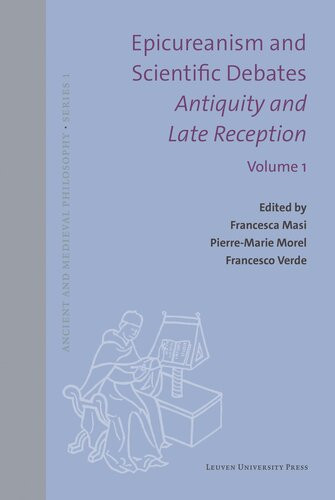

Most ebook files are in PDF format, so you can easily read them using various software such as Foxit Reader or directly on the Google Chrome browser.
Some ebook files are released by publishers in other formats such as .awz, .mobi, .epub, .fb2, etc. You may need to install specific software to read these formats on mobile/PC, such as Calibre.
Please read the tutorial at this link: https://ebookbell.com/faq
We offer FREE conversion to the popular formats you request; however, this may take some time. Therefore, right after payment, please email us, and we will try to provide the service as quickly as possible.
For some exceptional file formats or broken links (if any), please refrain from opening any disputes. Instead, email us first, and we will try to assist within a maximum of 6 hours.
EbookBell Team

4.7
16 reviewsEpicureanism is not only a defence of pleasure: it is also a philosophy of science and knowledge. This edited collection explores new pathways for the study of Epicurean scientific thought, a hitherto still understudied domain, and engages systematically and critically with existing theories. It shows that the philosophy of Epicurus and his heirs, from antiquity to the classical age, founded a rigorous and coherent conception of knowledge. This first part of a two-volume set examines more specifically the contribution of Epicureanism in the fields of language, medicine, and meteorology (i.e., celestial, geological and atmospheric phenomena).
Offering a renewed image of Epicureanism, the book includes studies on the nature of human language and on the linguistic aspects of scientific discourse; on the relationship between Epicureanism and ancient medicine, from Hippocrates to Galen; on meteorological phenomena and the method of explaining them; and on the reception of Epicurus's legacy in Gassendi.
Contributors: Julie Giovacchini (CNRS, Paris), Francesca Masi (Università Ca' Foscari Venezia), Dino De Sanctis (Università degli Studi della Tuscia), Chiara Rover (Universität Hamburg/MCAS), Enrico Piergiacomi (Universität Zürich), David Leith (University of Exeter), Vincenzo Damiani (Universität Ulm), David Konstan (New York University), Voula Tsouna (UC Santa Barbara), Jürgen Hammerstaedt (Universität zu Köln), Craig Martin (Università Ca' Foscari Venezia), Frederik Bakker (Radboud Universiteit)